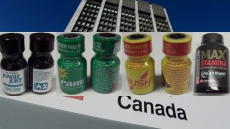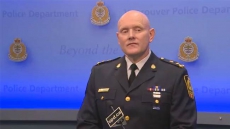RICHMOND, B.C. — Money from Ottawa to fight an ongoing overdose crisis helped sway British Columbia into signing a new 10-year, $1.4 billion health funding deal, says the province's health minister.
Terry Lake stood alongside federal Health Minister Jane Philpott on Friday as she announced the new agreement, which includes $785 million for home care and $654 for mental-health initiatives.
"Our governments will work together to strengthen health-care systems and reach our top priority, keeping Canadians healthy," Philpott said.
Lake has repeatedly said the province would not negotiate a separate deal with the federal government after talks between the provinces, territories and Ottawa broke down in December. They rejected a federal offer that would have poured an additional $25 billion over five years into health care, with money tagged specifically for mental health and home care.
Ottawa has been a tough negotiator, Lake said.
"I would be lying if I said we weren't hoping for more. But now we have this agreement, it's time to get down to work and make sure this money is targeted and achieves our common goals for all Canadians," he said.
Philpott also announced Friday that the federal government will spend $65 million across the country to combat the opioid crisis, which Lake said was "one of the reasons" B.C. signed the health deal.

The money will support what communities have asked for: better lab testing, data and surveillance, she said.
British Columbia has been the epicentre of the crisis and Philpott said the province will get an additional $10 million to help its emergency response.
Lake said the amount B.C. has spent to fight drug overdoses is approaching $100 million.
"It is a staggering amount of money, but (there is) a more staggering human toll that we're talking about here."
The province said Friday that 116 people died last month as a result of illicit drug use, in addition to a record 914 people last year.
There are indications that many of those who fatally overdoses were drug-dependent and hadn't been successful with a variety of treatment programs, chief coroner Lisa Lapointe said in a statement. It would be "wise to seriously consider" providing clean, medical-grade heroin to the "small subset of users for whom nothing else has worked," she said.
Philpott acknowledged in an interview that opioid overdoses have become "arguably the greatest public health crisis of our time," and said a broad range of treatment is necessary.

The federal government has overturned a ban on medical-grade heroin and, from a federal perspective, there's nothing standing in the way of the drug being prescribed to treat addiction, Philpott said.
"We have done our part on making sure that's possible and it will be up to provider groups and provinces to determine which route they will use. But certainly, there should be no tool that's not available to people in appropriate ways," she said.
Lake said the province will take direction from the B.C. Centre for Substance Use on whether an existing prescription heroin program in Vancouver should be expanded. But he said a multi-faceted approach is required to address the issue.
"I want to caution against any one thing that's going to solve this crisis."
Bev Gutray, CEO of the Canadian Mental Health Association in B.C., said the money will help address Ottawa's long-standing under-funding of mental health across the country.
But not all health advocates were enthused about Friday's announcement.
Terrie Hendrickson, a co-ordinator with the B.C. Health Coalition, said the deal provides less funding than what's needed to maintain current levels of care.
The group was surprised B.C. signed a separate agreement instead of holding out for a national plan, Hendrickson said.
"We're worried that every province has made different deals, that your health care is going to be different across the country," she said.
Alberta, Manitoba, Ontario and Quebec are the only provinces that have not signed separate agreements.
Alberta Premier Rachel Notley said conversations with the federal government continue.
"We want to make sure that we ultimately come to a resolution that is the best for Alberta, and obviously the best for Canada," Notley said in Edmonton on Friday.






